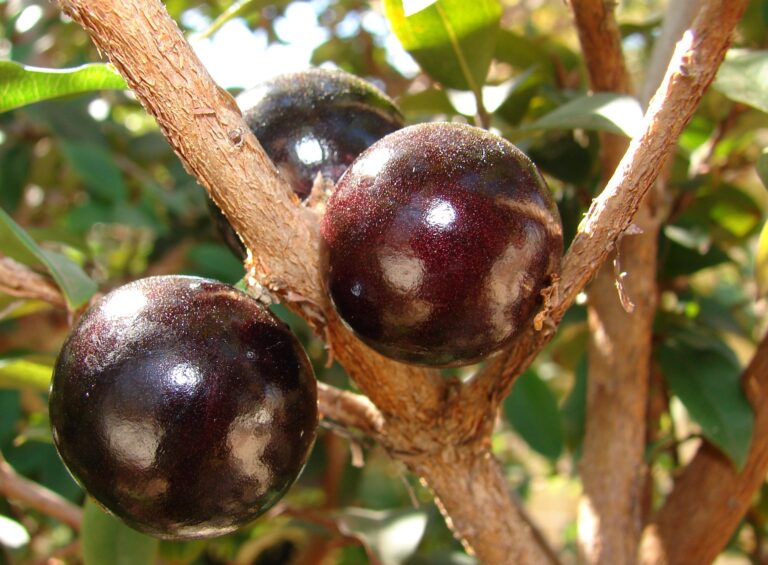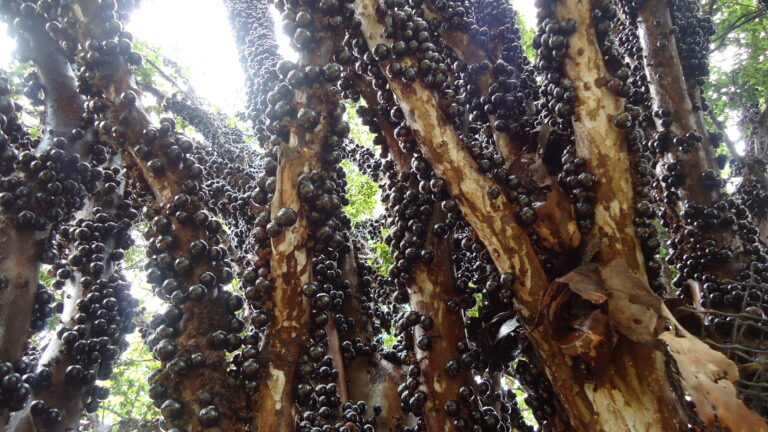Originally from the states of Minas Gerais and Sao Paulo in southeast Brazil, the Jabuticaba is a fruit-bearing tree of the Myrtaceae family.
There are several closely related species of Myrciaria found naturally in Brazil, Argentina, Paraguay, and Bolivia, all of which share the same common name.
The tree is cultivated for its edible, purple-black fruits with a white flesh, which can be enjoyed fresh or cooked into jams, jellies, and alcoholic beverages such as wine.

The Brazilian Grape Tree is also known as the Guaperu, Guapuru, Hivapuru, Sabara, and Ybapuru (Guarani), among other names.
Fresh jabuticabas, which are widely available in Brazilian markets and have a following comparable to that of grapes in the United States, are the preferred method of consumption.
Jams, tarts, robust wines, and liqueurs are frequently made from fresh fruit, which can begin to ferment just three to four days after harvest.
Fresh jabuticaba fruit is exceedingly hard to get in markets outside of areas of cultivation due to its exceptionally short shelf life.
An astringent decoction of the sun-dried skins has been used historically to cure hemoptysis, asthma, and diarrhoea, and to relieve chronic tonsil inflammation when gargled.
The fruit has been found to have several anti-cancer chemicals, including antioxidants, anti-inflammatory agents, and others. The fruit’s signature jaboticabin is one such compound.
Because of the abundance of tortoises, the Tupi people gave the area the name jabuticaba, which combines the words jabuti (tortoise) and caba (place).
Named “Yvapuru” by the Guarani people, the name comes from the onomatopoeic word “puru,” which means “crunch,” in reference to the sound the fruit makes when eaten into.

A young woman’s mouth is described as “as sweet as the achachairu” and her eyes as “soft black as the guapuru” in a traditional song from Bolivia’s eastern region.
The jabuticaba tree, which features on the coat of arms of Contagem, Minas Gerais, Brazil, is now commonly employed as a bonsai specimen, especially in Taiwan and the Caribbean.
Since the jabuticaba tree is said to be native solely to Brazil, the term “jabuticaba” has come to be used to refer to anything that is thought to be special to the country. It is typically used in a derogatory sense.
Health Benefits of Jabuticaba
The sun-dried skins of the jabuticaba tree are used to make a caustic decoction that is used to cure a variety of ailments in Brazil, including hemoptysis, asthma, diarrhea, and dysentery, and chronic inflammation of the tonsils. In addition, high tannin consumption is possible due to such fruit use.
The anti-aging, anti-inflammatory, and antioxidant properties seen in cranberries, grapes, and other closely related species are also present in Jaboticaba fruit.

1. Jabuticaba Fruit has been used medicinally for a variety of conditions, including as a stimulant, an expectorant (helpful for people with asthma), an astringent (excellent for those with diarrhea), and a healer (for those with tonsillitis).
2. The antioxidant and anti-inflammatory properties of jabuticaba fruit are well-documented.
3. The Jabuticaba fruit is a powerful anti-aging food that shares many of the same health advantages as cranberries.
4. The Jabuticaba fruit is low in carbohydrates, abundant in protein, calcium, iron, phosphorus, and vitamin C, and includes some B vitamins, all while having relatively little calories.
5. Due to its high concentration of anticancer chemicals, Jabuticaba is the subject of ongoing research.
6. Jabuticaba Fruit is good for your digestive system, your joints, and your skin and hair.
7. You can use Jabuticaba Fruit as a wonderful detoxifying agent.
8. Jabuticaba The anthocyanins in fruit are especially notable phenolic chemicals. The blue or purple color comes from a type of flavonoid called anthocyanins, which is the most common.
Apart from the polyphenolic content found on it, especially punicalagins, punicalins, gallagic acid, and ellagic acid, which work as potent antioxidants, anthocyanins are the only fatty acid thought to have a significant role in the health advantages conferred by this fruit.
9. Jaboticabin, a depside found in jabuticaba fruit, has been shown to have antibacterial, anti-HIV, antioxidant, and anti-proliferative activity, suggesting that it may play an even more significant part in the fruit’s health benefits than previously thought.
Interesting story: When tourist saw this fruit and acknowledged the health benefits, they took as much as they could and ran to the nearest location to wash and eat them!
Please SHARE this amazing fruit with Family and Friends!